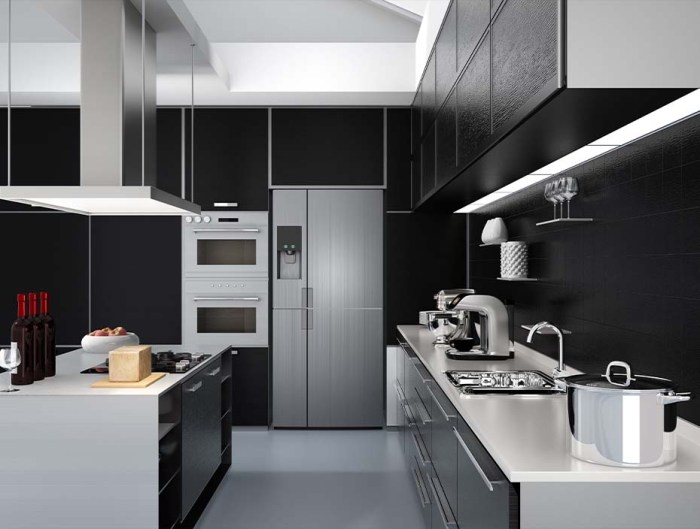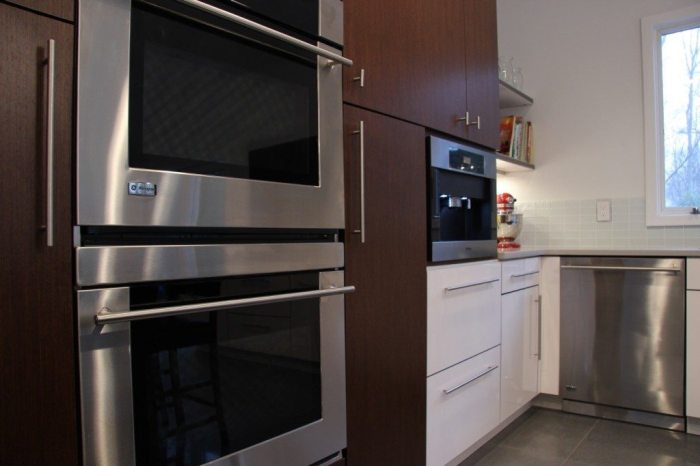Incorporating Smart Appliances into Your Modular Kitchen opens up a world of possibilities, transforming your kitchen into a hub of convenience, efficiency, and personalization. With the latest advancements in smart appliance technology, you can create a modular kitchen that seamlessly integrates these intelligent devices, optimizing space, functionality, and user experience.
In this comprehensive guide, we will delve into the benefits, trends, and best practices for incorporating smart appliances into your modular kitchen. From planning and design to connectivity and automation, we will provide you with all the essential information to create a smart kitchen that meets your unique needs and enhances your culinary experiences.
Exploring Smart Appliance Integration
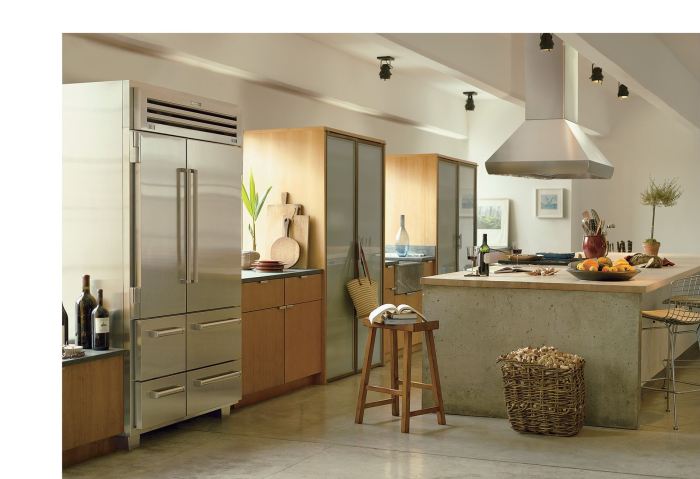
Integrating smart appliances into a modular kitchen offers a myriad of advantages. These cutting-edge devices elevate the cooking experience, enhance efficiency, and promote a healthier lifestyle. Let’s delve into the benefits and the latest advancements in smart appliance technology.
Smart appliances seamlessly connect to the internet, enabling remote control and monitoring through smartphones or tablets. This convenience allows you to preheat the oven while you’re still in bed, adjust the refrigerator temperature while you’re at work, or check if the dishwasher has finished its cycle from anywhere.
Energy Efficiency
Smart appliances are designed to optimize energy consumption, reducing your carbon footprint and utility bills. They feature sensors that monitor usage patterns and adjust settings accordingly. For instance, a smart refrigerator can detect when the door is left open and automatically adjust the temperature to minimize energy loss.
Enhanced Safety
Safety is paramount in any kitchen. Smart appliances incorporate advanced safety features that provide peace of mind. Leak detectors in smart dishwashers alert you to potential water leaks, while smart ovens automatically shut off if they detect overheating.
Improved Cooking Precision
Cooking enthusiasts will appreciate the precision offered by smart appliances. Smart ovens can be programmed with exact temperatures and cooking times, ensuring perfect results every time. Induction cooktops provide precise heat control, allowing you to sear, simmer, or boil with ease.
Integration with Smart Home Systems
Smart appliances can be integrated with smart home systems like Amazon Alexa or Google Assistant. This allows you to control your appliances using voice commands, creating a truly hands-free cooking experience. You can ask Alexa to preheat the oven or Google Assistant to start the dishwasher, making multitasking a breeze.
Personalized Cooking Recommendations
Some smart appliances offer personalized cooking recommendations based on your preferences and dietary restrictions. Smart ovens can suggest recipes tailored to your tastes, while smart refrigerators can provide meal ideas based on the ingredients you have on hand.
Remote Diagnostics and Maintenance
Smart appliances often come with remote diagnostics and maintenance capabilities. If you encounter any issues, you can contact the manufacturer remotely for troubleshooting and repairs. This can save you time and hassle, ensuring your appliances are always functioning optimally.
Optimizing Space and Functionality
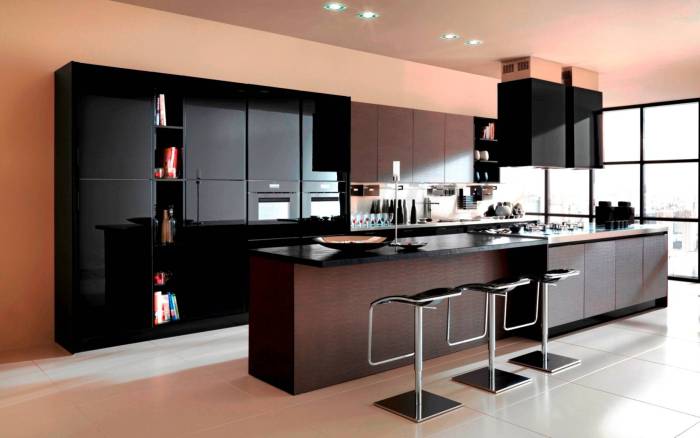
Designing a modular kitchen that seamlessly integrates smart appliances requires careful planning to maximize space and functionality. Consider the following steps:
First, determine the essential smart appliances you want to incorporate and their dimensions. Plan the layout accordingly, ensuring there’s ample space for each appliance to operate efficiently. Utilize vertical space by installing wall-mounted appliances or stackable units.
Maximizing Storage and Workspace, Incorporating Smart Appliances into Your Modular Kitchen
*
-*Smart Storage Solutions
Utilize smart storage systems like pull-out drawers, under-cabinet organizers, and vertical storage racks to maximize storage capacity. These solutions provide easy access to utensils, appliances, and pantry items.
-
-*Multifunctional Appliances
Choose smart appliances that serve multiple functions, such as a refrigerator with a built-in ice maker or a dishwasher with a sanitizing cycle. This eliminates the need for separate appliances, saving space.
-*Integrated Appliances
Consider integrating appliances into the cabinetry, such as a built-in oven or a dishwasher that seamlessly blends with the kitchen design. This creates a sleek and cohesive look while optimizing space.
-*Hidden Appliances
Utilize hidden appliances, such as a retractable countertop that conceals a built-in cooktop or a pop-up outlet for small appliances. These solutions keep the kitchen clutter-free and maximize workspace.
Enhancing User Experience
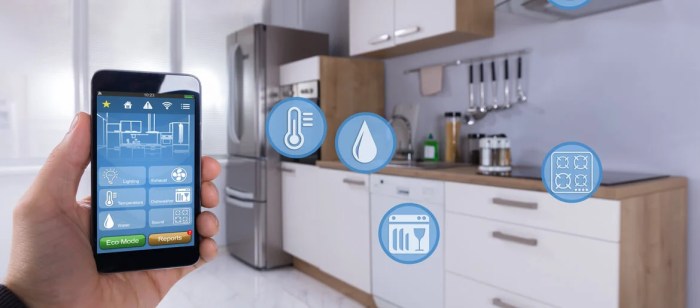
Smart appliances are revolutionizing the kitchen, offering a range of features and functions that enhance convenience, efficiency, and personalization. These appliances seamlessly integrate with your daily routine, making cooking and other kitchen tasks easier and more enjoyable.
Key Features and Functions of Smart Appliances
| Feature | Function ||—|—|| Remote control | Control appliances from anywhere using a smartphone or tablet || Voice control | Issue commands to appliances using voice assistants || Automation | Set appliances to perform tasks automatically based on schedules or triggers || Monitoring and diagnostics | Track appliance performance and receive alerts for maintenance || Recipe integration | Access and follow recipes directly on the appliance’s display || Personalized settings | Tailor appliance settings to your preferences, such as cooking temperatures and cleaning cycles |
Convenience and Efficiency
Smart appliances streamline kitchen tasks, saving you time and effort. Remote control allows you to preheat the oven, start the dishwasher, or check the status of your fridge from anywhere in the house. Automation features can schedule appliances to turn on or off at specific times, ensuring your meals are ready when you are.
Monitoring and diagnostics provide peace of mind, alerting you to any potential issues before they become major problems.
Personalization
Smart appliances adapt to your individual needs and preferences. Personalized settings allow you to customize cooking temperatures, cleaning cycles, and other appliance functions to suit your specific tastes. Recipe integration provides access to a vast library of recipes, enabling you to experiment with new dishes and flavors.
By tailoring appliances to your lifestyle, smart kitchens offer a truly personalized cooking experience.
Connectivity and Automation: Incorporating Smart Appliances Into Your Modular Kitchen
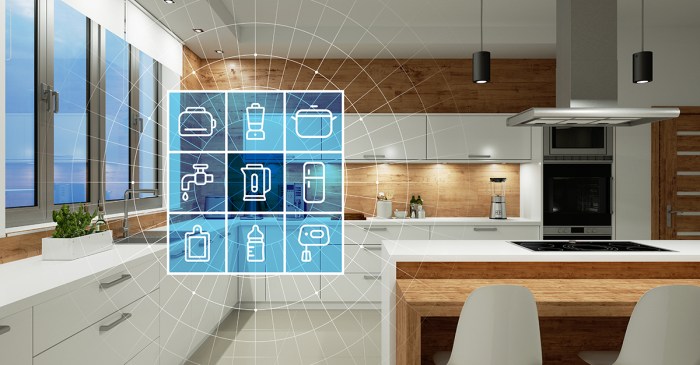
In a smart kitchen, connectivity and automation are crucial. Smart appliances can seamlessly integrate with other smart home devices, creating a cohesive ecosystem that streamlines tasks and enhances user experience. This integration enables remote control, automated routines, and real-time monitoring.
Remote Control
Smart appliances can be controlled remotely via smartphones, tablets, or voice assistants. This allows users to operate their appliances from anywhere, whether they’re in the kitchen or on the go. They can preheat the oven, start the dishwasher, or adjust the refrigerator temperature with just a few taps or voice commands.
Future-Proofing Your Kitchen
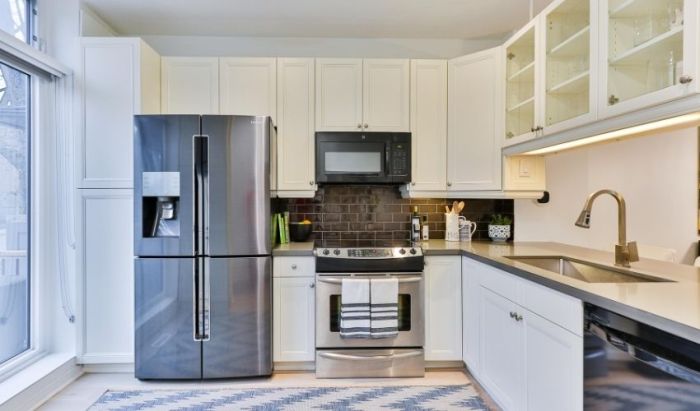
Smart kitchens are rapidly evolving, and it’s important to design your kitchen with future-proof elements to ensure it remains functional and up-to-date for years to come. Here’s a vision for the future of smart kitchens and how to incorporate future-proof features into your design:
Voice Control and AI Integration
Voice control and artificial intelligence (AI) will play an increasingly important role in smart kitchens. By incorporating voice-activated appliances and AI-powered systems, you can streamline tasks, access information, and control your kitchen with ease.
Modular Design and Flexibility
Modular kitchen designs allow for easy customization and reconfiguration. By choosing modular components, you can adapt your kitchen to changing needs and incorporate new appliances and technologies as they become available.
Sustainability and Energy Efficiency
Smart appliances are becoming increasingly energy-efficient, helping you reduce your environmental impact and save money on energy bills. Look for appliances with energy-saving features, such as Energy Star certification, to future-proof your kitchen.
Smart Storage and Organization
Smart storage solutions, such as automated drawers and intelligent refrigerators, can help you organize and manage your kitchen space more efficiently. These systems can track inventory, suggest recipes based on available ingredients, and even order groceries when needed.
Connectivity and Integration
Seamless connectivity and integration between appliances and devices will be crucial in future smart kitchens. By ensuring your appliances are compatible with each other and with smart home platforms, you can create a truly interconnected and automated kitchen ecosystem.
Final Thoughts
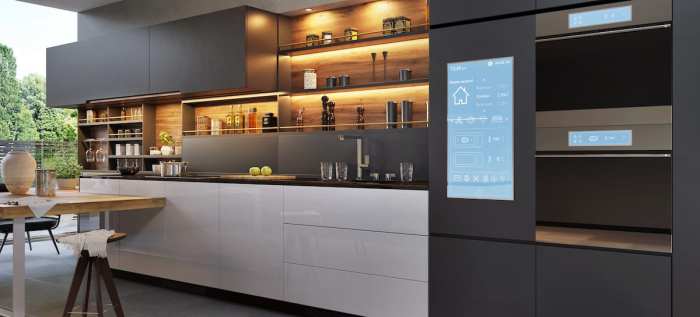
By incorporating smart appliances into your modular kitchen, you not only elevate your cooking and dining experiences but also create a future-proof space that adapts to your evolving needs. As technology continues to advance, your smart kitchen will remain at the forefront of innovation, providing you with endless possibilities for convenience, efficiency, and culinary creativity.
FAQ Resource
What are the benefits of incorporating smart appliances into a modular kitchen?
Smart appliances offer a wide range of benefits, including increased convenience, efficiency, personalization, and energy savings.
How do I design a modular kitchen that seamlessly integrates smart appliances?
When designing your modular kitchen, consider the size and placement of smart appliances to ensure they fit seamlessly into your workflow and optimize space.
What are the key features and functions of popular smart appliances?
Smart appliances come with a variety of features and functions, such as remote control, voice activation, automated cooking programs, and energy monitoring.
How can I integrate smart appliances with other smart home devices?
Many smart appliances can be integrated with other smart home devices through Wi-Fi or Bluetooth, allowing you to create a cohesive ecosystem that responds to your voice commands or automated routines.
How can I future-proof my smart kitchen?
To future-proof your smart kitchen, choose appliances that are compatible with the latest smart home standards and consider incorporating modular elements that can be easily upgraded or replaced as technology advances.
